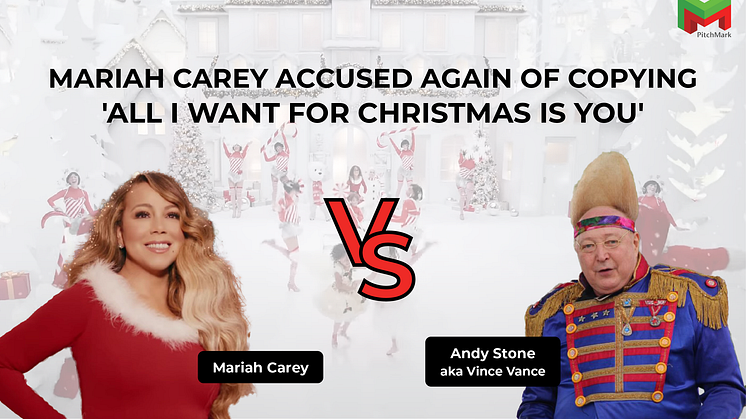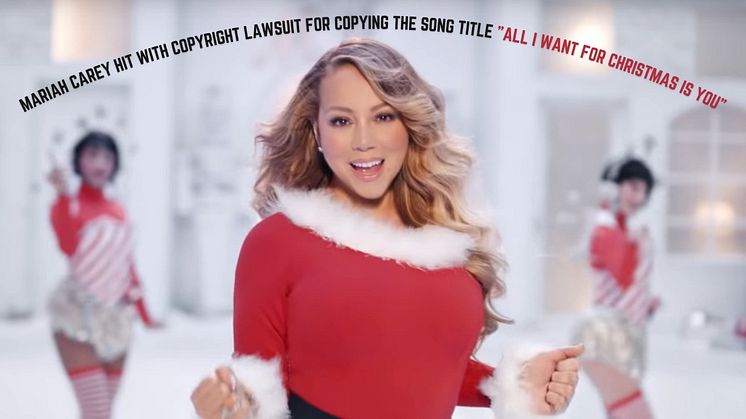
News -
Mariah Carey accused again of copying 'All I Want for Christmas Is You'
Songwriter Andy Stone has filed a second copyright infringement lawsuit against Mariah Carey’s team claiming that her 1994 hit song “All I Want for Christmas is You" is in fact an unauthorized infringement of his 1989 release with the same title.
The action, filed on November 1st against Carey and her co-writer Walter Afanasieff and co-defendants Sony Music Entertainment, Kobalt Music Publishing America, Wally World Music LLC, and Universal Music Corp. in the United States District Court for the Central District of California, seeks a judicial determination of infringement, the delivery and destruction (or deletion) of all infringing copies of the work, a permanent injunction against its future performance, and at least USD 20 million in damages.
The complaint follows on from an earlier lawsuit filed but abandoned in June 2022. Vance has been joined this time around by co-composer, Troy Powers, claiming their version of the Christmas classic reached the charts several times and was still playing when Carey's song started to gain popularity. A stage artist since 1971, Vance claims his band has “performed his hit songs in over 8,000 concerts across more than twenty countries” and that Carey and her team “undoubtedly had access” to the song before writing and releasing a competing version some five years after developing and publishing their version.
"[This] points to the overwhelming likelihood that Carey and Afanasieff both career musicians and songwriters, who knew the importance of charting on Billboard, had access to the Vance work prior to the composition of the infringing work in question."
The lawsuit further claims that parts of the music were plagiarized, stating: "The phrase 'all I want for Christmas is you' may seem like a common parlance today, in 1988 it was, in context, distinctive. Moreover, the combination of the specific chord progression in the melody paired with the verbatim hook was a greater than 50% clone of Vance’s original work, in both lyric choice and chord expressions." The accusations center on the "unique linguistic structure" of the songs, arguing that Vance and his band only employed the term in a way that was specific to their song and not necessarily the originator of the phrase.
Musicologists and commentators have suggested that the festive holiday mood created in the song is actually because of its dulcet harmony, including a specific minor subdominant chord, which these commentators have dubbed the most “Christmassy” chord of all (a diminished C6 chord). This chord is of course already found throughout Plaintiffs’ version of the song. Specifically, the songs share a similar syncopated chord pattern. Using the same harmonic language for the C and G and diminished C6 chords throughout the two songs and that dulcet harmony directly lifted from Plaintiffs’ original.
Whereas other recording artists, including American Idol Kelly Clarkston, properly licensed and credited Vance’s rights to the songs in their subsequent cover versions, Carey’s claim to have independently conceived her version during her childhood has been publicly disputed by co-composer Afanasieff’s comments that “…she doesn’t play anything, she doesn’t play keyboard or piano.”…”she doesn’t understand music, she doesn’t know chord changes in music theory or anything like that. She doesn’t know a diminished chord, from an A minor 7th chord to an A major 7thchord. So, to claim that she wrote a very complicated chord-structured song with her finger on a Casio keyboard when she was a little girl, it’s kind of a tall tale…She doesn’t play any instrument.”
"Carey has without licensing, palmed off these works with her incredulous origin story, as if those works were her own. Her hubris knowing no bounds, even her co-credited songwriter doesn’t believe the story she has spun. This is simply a case of actionable infringement," the complaint concludes.
PitchMark™ has previously reported that, while there is no copyright protection in song titles, the test for determining infringement relies on successfully proving a defendant’s prior access to the allegedly infringed work, as well as a substantial similarity between the competing versions. Should the case progress, it will next fall to a jury to make factual determinations in response to each allegation.
PitchMark helps innovators deter idea theft, so that third parties that they share their idea with get the idea but don’t take it. Visit PitchMark.net and register for free as a PitchMark member today.



